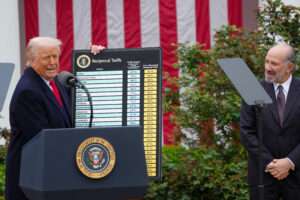

Today, the Liberty Justice Center and I filed a motion for a preliminary injunction, temporary restraining order, and summary judgment in our case challenging Donald Trump’s massive “Liberation Day” tariffs. The motion sets out our arguments in greater detail than the complaint filed on Monday. For a shorter and more accessible overview of the reasons why these tariffs are illegal, see my just-published Lawfare article “The Constitutional Case Against Trump’s Trade War.” The case is entitled VOS Selections, Inc. v. Trump.
We are litigating the case (pro bono) on behalf of five US businesses that import goods from many of the countries targeted by the tariffs. As explained in today’s motion, the new tariffs are inflicting grave harm on them, and in at least some cases threaten their viability.
In earlier posts, previewed our key arguments and explained why Trump’s partial pause of the tariffs does not end the madness or obviate the need to challenge this usurpation of legislative power in court.
To briefly summarize our position, we argue that the International Emergency Economic Powers Act of 1977 (IEEPA) doesn’t authorize tariffs at all, that even if it does the trade deficits targeted by the “Liberation Day” tariffs do not qualify as an “emergency” or as an “unusual and extraordinary threat” (both prerequsites to invoking IEEPA), that Trump’s use of IEEPA to impose massive tariffs runs afoul of the “major questions” doctrine, and that – if these tariffs are somehow authorized by IEEPA – it would violate constitutional limits on delegation of legislative power to the executive. If we prevail on any one of these points, we win the case.
The new motion also explains why we are entitled to a preliminary injunction and temporary restraining order. If we get either or both, implementation of the tariffs will be blocked while the case is litigated, thereby protecting our clients and the US and world economy from grave and irreparable harm.
The court has ordered the government to file a response to our motion by close of business on Monday. This tight schedule may be a positive sign for us, as it suggests the court recognizes the importance of the case, and the potential need for a quick injunction to prevent further harm to our clients and others.

















